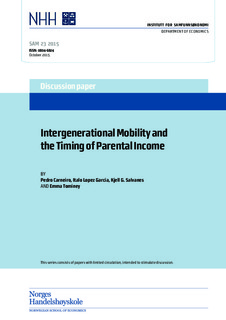| dc.description.abstract | We extend the standard intergenerational mobility literature by modelling individual outcomes
as a function of the whole history of parental income, using data from Norway. We find that,
conditional on permanent income, education is maximized when income is balanced between the
early childhood and middle childhood years. In addition, there is an advantage to having income
occur in late adolescence rather than in early childhood. These result are consistent with a model
of parental investments in children with multiple periods of childhood, income shocks, imperfect
insurance, dynamic complementarity, and uncertainty about the production function and the ability
of the child. | nb_NO |
